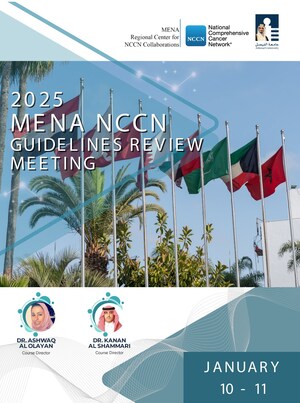PLYMOUTH MEETING, Pa., Aug. 2, 2021 /PRNewswire/ -- New research in the July 2021 issue of JNCCN—Journal of the National Comprehensive Cancer Network indicates a need to increase substance use and mental health support capabilities at cancer centers across the United States. Past studies have determined that people diagnosed with cancer within the past decade have a higher prevalence for substance use disorders than those with no recent cancer diagnosis.[1][2] Researchers from the Mayo Clinic used the American Hospital Association, Area Health Resource File, and Centers for Medicare & Medicaid Services Hospital Compare databases to analyze the psychosocial support being offered by more than 1,000 cancer centers across America. They found that most centers offered mental health services (85.4%), but less than half offered chemical dependency services (45.5%), and even fewer offered both (44.1%).
"Cancer patients commonly experience mental health and chemical dependency issues. If clinicians and patients do not identify and treat these conditions, they can lead to poorer quality-of-life, increasing complications, additional caregiver burden, and even reduced survival. The resulting increase in resource utilization can also lead to increased out-of-pocket expenses and costs to payers," said lead researcher Shehzad K. Niazi, MD, FRCPC, a psychiatrist at the Mayo Clinic in Florida.
Dr. Niazi continued: "As one possible solution, cancer center clinicians could establish formal referral relations with community partners where available. The recent dramatic uptake in telehealth may provide new opportunities for providing these services to more patients as well."
According to the findings, centers located in more diverse areas were less likely to offer mental health and chemical dependency services.
"When you think about the context of a person's life, there are going to be factors that help and those that hinder how they go through cancer treatment. It is critical to screen, assess, and intervene for factors beyond the treatment-related side effects for patients in active treatment and in survivorship, as detailed in the NCCN Guidelines for Distress Management," commented Cheyenne Corbett, PhD, Supportive Care & Survivorship Center, Center for Onco-Primary Care, Duke Cancer Institute, who was not involved in this research. "While there is now a recognition that this care is critical, and there are accreditation standards to ensure psychosocial screening and intervention, there are still many barriers to providing mental health and chemical dependency care for patients facing the impact of cancer on their lives."
Dr. Corbett—a member of the NCCN Clinical Practice Guidelines in Oncology (NCCN Guidelines®) Panel for Distress Management—continued: "The investigators have described the need for psychosocial services at cancer centers across the country, and shone a light on the differences in their availability. It is our duty to address these differences with innovative and collaborative approaches within and beyond the walls of our individual cancer centers."
To read the entire study, visit JNCCN.org. Complimentary access to "Mental Health and Chemical Dependency Services at US Cancer Centers" is available until October 10, 2021.
About JNCCN—Journal of the National Comprehensive Cancer Network
More than 25,000 oncologists and other cancer care professionals across the United States read JNCCN—Journal of the National Comprehensive Cancer Network. This peer-reviewed, indexed medical journal provides the latest information about innovation in translational medicine, and scientific studies related to oncology health services research, including quality care and value, bioethics, comparative and cost effectiveness, public policy, and interventional research on supportive care and survivorship. JNCCN features updates on the NCCN Clinical Practice Guidelines in Oncology (NCCN Guidelines®), review articles elaborating on guidelines recommendations, health services research, and case reports highlighting molecular insights in patient care. JNCCN is published by Harborside. Visit JNCCN.org. To inquire if you are eligible for a FREE subscription to JNCCN, visit NCCN.org/jnccn/subscribe. Follow JNCCN on Twitter @JNCCN.
About the National Comprehensive Cancer Network
The National Comprehensive Cancer Network® (NCCN®) is a not-for-profit alliance of leading cancer centers devoted to patient care, research, and education. NCCN is dedicated to improving and facilitating quality, effective, efficient, and accessible cancer care so patients can live better lives. The NCCN Clinical Practice Guidelines in Oncology (NCCN Guidelines®) provide transparent, evidence-based, expert consensus recommendations for cancer treatment, prevention, and supportive services; they are the recognized standard for clinical direction and policy in cancer management and the most thorough and frequently-updated clinical practice guidelines available in any area of medicine. The NCCN Guidelines for Patients® provide expert cancer treatment information to inform and empower patients and caregivers, through support from the NCCN Foundation®. NCCN also advances continuing education, global initiatives, policy, and research collaboration and publication in oncology. Visit NCCN.org for more information and follow NCCN on Facebook @NCCNorg, Instagram @NCCNorg, and Twitter @NCCN.
[1] Mehnert A, Hartung TJ, Friedrich M, et al. One in two cancer patients is significantly distressed: prevalence and indicators of distress. Psychooncology 2018;27:75–82.
[2] Mallet J, Huillard O, Goldwasser F, et al. Mental disorders associated with recent cancer diagnosis: results from a nationally representative survey. Eur J Cancer 2018;105:10–18.
Media Contact:
Rachel Darwin
267-622-6624
[email protected]
SOURCE National Comprehensive Cancer Network

WANT YOUR COMPANY'S NEWS FEATURED ON PRNEWSWIRE.COM?
Newsrooms &
Influencers
Digital Media
Outlets
Journalists
Opted In






Share this article